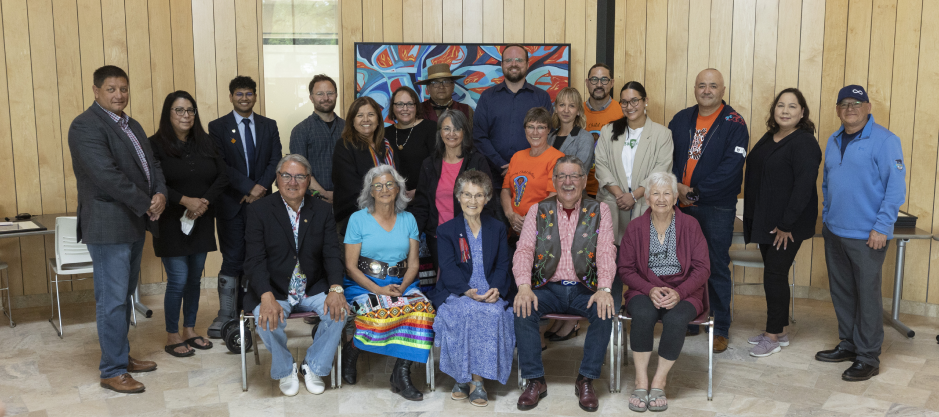deybwewin | taapwaywin | tapwewin
Indigenous Truth Policy on Indigenous citizenship/membership
You are entering into Indigenous space.
Please enter with respect and a good heart.

Read the story behind the knife
deybwewin | taapwaywin | tapwewin: Indigenous Truth
The name of this policy means truth – truth to self, truth to each other, truth to the ancestors and truth to the land. The intent of deybwewin | taapwaywin | tapwewin (Saulteaux, Michif, Cree) is to protect Indigenous truth and space for everyone.
The University of Saskatchewan’s deybwewin | taapwaywin | tapwewin policy provides a framework for the implementation of Indigenous membership/citizenship verification with documentation. The University of Saskatchewan is committed to safeguarding the cultures and integrity of Indigenous peoples, Indigenous values, and Indigenous languages within the university.
Verification with documentation can take many forms. These will be defined by Indigenous governments and conveyed to the deybwewin | tapwewin | taapwaywin Standing Committee. Examples of verification with documentation can be, and are not limited to, a letter from a community’s governance body, an Indigenous government-issued membership or citizenship card, or a status card issued by Indigenous Services Canada.
In situations where Indigenous government-approved documentation is not available, the deybwewin | tapwewin | taapwaywin Standing Committee will guide and support the individual through a deybwewin | tapwewin | taapwaywin.
The deybwewin | taapwaywin | tapwewin policy was developed by an Indigenous led and informed taskforce that included Elders, Knowledge Keepers, cultural advisors, faculty, staff, students, and community members. This policy provides a framework for the implementation of Indigenous membership/citizenship verification with documentation at USask to safeguard the cultures and integrity of Indigenous peoples, Indigenous values, and Indigenous languages at USask. The policy ensures that material gain is provided to those it is meant for, and to protect Indigenous truth and space at USask.
Types of Approved Documents
It is the sovereign and inherit right of Indigenous governments to determine the membership/citizenship of their communities. The University of Saskatchewan recognizes and honours this sovereign right through the verification process. Documentation is determined and defined by Indigenous governments and conveyed to the deybwewin | taapwaywin | tapwewin Standing Committee.
Below is a list of approved verification document types for for Inuit, Métis, First Nations, and international students, staff, faculty, and other members of the University of Saskatchewan.
All documentation must be current and up-to-date.
Membership of one the four collectives defined by the Inuit Tapiriit Kanatami (ITK) from Section 1.4 of the Inuit Nunangat Policy, C-IRNAC):
- The Inuvialuit Regional Corporation (Inuvialuit Final Agreement)
- Nunavut Tunngavik Incorporated (Nunavut Agreement)
- Makivvik (James Bay and Northern Quebec Agreement, Nunavik Inuit Land Claims Agreement)
- The Nunatsiavut Government (Labrador Inuit Land Claims Agreement)
- Letter from Métis Nation-Saskatchewan stating the individual has met the criteria for citizenship from the registrar
OR
- Métis Nation-Saskatchewan Citizenship card. For more information: https://metisnationsk.com/citizenship/
- Valid Métis Nation Citizenship cards from MN-British Columbia, MN-Alberta, Manitoba Métis Federation, MN-Ontario will also be accepted.
- Documentation is to be determined by each First Nations government.
- Documentation should be up to date.
- If an agreement has not yet been reached with your Nation, BOTH a status card and a verification letter will be required.
- “Conditionally verified” For Nations we do not yet have agreements with status will say conditional upon verification of agreement with your Nation. This is only temporary until an agreement is reached. To expedite the change of your status to verified, you may upload a letter from your registrar confirming your membership.
- If you are having trouble uploading your documents, please save your documents as pdf’s and try uploading them again.
We seek to create and maintain agreements with First Nations governments. First Nations governments outside Saskatchewan will be contacted as needed.
By way of entering the deywbewin | taapwaywin | tapwewin: Indigenous Truth Policy portal, you are giving permission to the Office of the Vice-Provost, Indigenous Engagement to contact your government regarding your membership/citizenship.
The following Nations require a status card and/or a verfication letter:
- Peter Ballantyne Cree Nation
- Lac La Ronge Indian Band
- Ahtahkakoop Cree Nation
- Beardy's & Okemasis Cree Nation
- Canoe Lake Cree Nation
- Clearwater River Dene Nation
- Mistawasis First Nation
- Sturgeon Lake First Nation
- Big River First Nation
- Muskoday First Nation
- Cote First Nation
- Montreal Lake Cree Nation
- Kawacatoose First Nation
- Ochapowace First Nation
- Waterhen Lake First Nation
- Little Pine First Nation
- Moosomin First Nation
- Cowessess First Nation
- Kahkewistahaw First Nation
- Piapot First Nation
- Red Earth Cree Nation
- Saulteaux First Nation
- Cumberland House Cree Nation (Letter from membership or Post-Secondary Coordinator)
The following Nations require a Verification Letter ONLY
- Sweetgrass First Nation
- Thunderchild First Nation
- Onion Lake Cree Nation
- Red Pheasant First Nation
- Yellow Quill First Nation
The following Nations require a Status Card AND Verification Letter
- James Smith Cree Nation
- Okanese First Nation
For questions related to agreements please reach out to your band registrar, for questions related to the deybwewin-taapwaaywin-tapwewin policy please email indigenoustruthpolicy@usask.ca
- If you are a non-status First Nations individual, we kindly ask that you provide a letter from the First Nations government you are connected to. This letter should confirm your relationship and connection to the Nation.
- If you are having trouble uploading your documents, please save your documents as pdf’s and try uploading them again.
We seek to create and maintain agreements with First Nations governments. First Nations governments outside Saskatchewan will be contacted as needed.
By way of entering the deywbewin | taapwaywin | tapwewin: Indigenous Truth Policy portal, you are giving permission to the Office of the Vice-Provost, Indigenous Engagement to contact your government regarding your membership/citizenship.
- USA: Tribal Enrollment cards with Bureau of Indian Affairs assigned numbers and consultation with Indigenous communities directly.
- Indigenous communities outside Turtle Island (Māori, Hawaiian, Indigenous from Australia, etc.) will be address on a case-by-case basis.
The No Documentation option is only available for those whose Indigenous communities do not participate in colonial documentation.
Please note that the no documentation option is not implemented/enacted in situations where individuals are awaiting applications for membership/citizenship or non-status in Canada. The University of Saskatchewan recognizes and honours the sovereign and inherent right of Indigenous governments to determine membership/citizenship; membership/citizenship and documentation for verification is determined and defined by Indigenous governments.
In the situation where there is an absence of colonial documentation, a signed/sworn notarized/legal affidavit outlining the following:
- the lineage and connection to said community (personal narrative),
- historical and geographical account of membership to community.
Additional documents to accompany signed/sworn notarized/legal affidavit:
- two (minimum) community references bearing witness to the applicant’s membership to said community.
- one reference by a member of the community who has personal history with the applicant,
- and one reference to be solicited by the University of Saskatchewan
The USSU at USask offers free notary services to undergraduate students; for graduate students, notary fees related to the deybwewin| taapwaywin| tapwewin: Indigenous Truth policy through the USSU will be covered by the Office of the Vice Provost, Indigenous Engagement.
The University of Saskatchewan’s deybwewin | taapwaywin | tapwewin policy provides a framework for the implementation of Indigenous membership/citizenship verification with documentation. Examples of when a student may choose to go through the verification process are when there is a material advantage such as Indigenous specific scholarships, awards, bursaries, Indigenous specific positions, seats in Indigenous student programs, etc. Verification with documentation will be defined by Indigenous governments and conveyed to the deybwewin | tapwewin | taapwaywin Standing Committee. Examples of verification with documentation can be, and are not limited to, a letter from a community’s governance body, an Indigenous government-issued membership or citizenship card, or a secured certificate of Indian status issued by Indigenous Services Canada. In situations where Indigenous government-approved documentation is not available, the deybwewin | tapwewin | taapwaywin Standing Committee will guide and support the individual and the university through the process once they have uploaded their narrative, historical and geographical account of membership to community, and references as per the policy.
Submit Your Documentation
Visit our online verification system to begin the process and submit your documents.
Frequently Asked Questions
This policy provides a framework for the implementation of Indigenous membership/citizenship verification with documentation at USask in order to safeguard the cultures and integrity of Indigenous peoples, Indigenous values, and Indigenous languages at USask.
The policy applies to all members of the university community including, but not limited to, students, researchers, post-doctoral fellows, staff, faculty, institutional leadership, members of governing bodies, Elders, Cultural Advisors, and Knowledge Keepers, and any person participating in university business or activities (e.g., service provider, contractor, volunteer) where there is material gain.
Yes, this option still exists for students but is separate from the deybwewin | taapwaywin | tapwewin verification system. However, in any scenario where there is a material gain such as scholarships, seats, etc. verification through the portal is required.
Everyone on campus is responsible for enacting the policy and ensuring it is implemented. Though the reason for proceeding through the process may differ, staff, faculty, and students will navigate through the verification system on PAWS through their personal profile page.
The implementation plan further outlines the steps for job postings/employment, scholarships, Indigenous-specific programs, awards, etc.
If you have specific questions about process or would like support, please contact: indigenoustruthpolicy@usask.ca
No, all documentation is collected and securely stored within the deybwewin | taapwaywin|tapwewin portal in PAWS and is managed by OVPIE. If any other unit is requesting this information from you, please direct them to indigenoustruthpolicy@usask.ca
The Office of the Vice Provost, Indigenous Engagement (OVPIE) has worked with the Information & Communications Technology team at USask to create a secure system that will house the data. Only select members of the OVPIE team will have access; no other department or individuals outside of OVPIE will have access to the documentation and personal information.
If your documentation has been reviewed, you will receive and email notification of this. Once you log in, if this has changed to anything other than verified, please review the notes as additional information or action may be required. If you still have questions, please contact indigenoustruthpolicy@usask.ca.
If you have uploaded additional documentation after your documents have already been reviewed, the status will reset to ‘requiring review.’ If you have uploaded additional documentation at the request of the system due to a pending deadline (ie scholarship, admissions, etc), please feel free to inform us via email at indigenoustruthpolicy@usask.ca
For Nations we do not yet have agreements with, status will say conditional upon verification of agreement with your nation. This is only temporary until an agreement is reached. To expedite the change of your status to verified, you may upload a letter from your registrar confirming your membership.
- An application is submitted and flagged as Indigenous specific
- An Admissions Officer curates a confidential list for review by OVPIE
- Student applicant submits documentation via the portal.
- OVPIE reviews documentation and verifies or requests additional documentation from student.
- The only information shared with admissions (or any other unit on campus) is the status of documentation, ie verified, conditionally verified, or pending.
- This process can be stalled if action is required such as awaiting additional documentation and/or information from the applicant. If your status is set to anything other than verified, please review the notes in the portal for what information is needed.
The process of uploading documentation for verification remains the same and is done through PAWS. The data is housed on a confidential, secure system that is only accessed as required during your time at USask.
If your role at USask shifts or you have multiple roles (such as a staff member who is currently a student), you will not be required to upload additional documentation for each role. In recognition that many students return to academic studies and individuals may frequently apply for positions at USask, the data will be stored for a period of five years after which you are no longer active at USask.
If you are having trouble uploading your documents, please save your documents as PDF and try uploading again.
Please notify OVPIE of your deadline as soon as you are able to so we are able to allocate time for review in advance. Typical turn around time can vary depending on time of year, however we aim to review within 5-10 business days.
For lists with five applicants and under, please send via email to indigenoustruthpolicy@usask.ca. For lists with more than five, please create a shared Excel document that can be reviewed and edited on USask OneDrive. This list will be reviewed and updated regularly. Should you need a secondary review, please do not hesitate to send reminders to indigenoustruthpolicy@usask.ca, especially during peak periods.
Please contact your HR SBA who will support you and provide you with the detailed hiring guide. Should you have any additional questions, please contact indigenoustruthpolicy@usask.ca.
Contact Us
If you have other questions or for additional information contact us via email or phone.
indigenoustruthpolicy@usask.ca

Standing Committee
|
Chair: Dr Angela Jaime Elder Joseph Naytowhow Elder Norman Fleury Dr Karla Jessen Williamson Dr Kurtis Boyer Val Arnault-Pelletier
|
Yvette Arcand Dr Amaranta Sokól Carson Magnuson Vanessa Hyggen
|
Standing Committee Terms of Reference
These Terms of Reference outline the role of the deybwewin (Saulteaux) | taapwaywin (Michif) | tapwewin (Cree) Standing Committee, to formalize and define their purpose, mandate, authority, and composition.

deybwewin (Saulteaux) | taapwaywin (Michif) | tapwewin (Cree) Task Force and Advisory Circle led and guided the USask community through the development and co-creation of a policy—as well as accompanying procedures and implementation plan—that will direct an appropriate, informed, and Indigenous-led process of Indigenous membership/citizenship verification with documentation at USask. The policy and procedures will inform decision-making across multiple contexts including but not limited to admissions, human resources activities (recruitment, promotion, and retention decisions, etc.), research and scholarly work, scholarships and awards. In doing so, the Task Force’s work will contribute to securing and ensuring that space intended for Indigenous people, is protected and secured for Indigenous people.
The name deybwewin (Saulteaux) | taapwaywin (Michif) | tapwewin (Cree) translates to “truth.”
The Task Force was chaired by Dr. Angela Jaime, interim Vice Provost, Indigenous engagement. For information, please contact angela.jaime@usask.ca.
Terms of Reference
Members of the Task Force:
|
Chair: Angela Jaime Elder Harvey Thunderchild Elder Joseph Naytowhow Elder Josie Searson Elder Louise Halfe Elder Louise Pederson Elder Norman Fleury Bob Badger Dale Worme Tribal Chief Mark Arcand Rhonda Bluehorn Doloris Netmaker |
Robin McLeod Winona Wheeler Karla Jessen Williamson Kurtis Boyer Mary Longman Graeme Joseph Sheila Pocha Val Arnault-Pelletier |
Yvette Arcand Adam McInnes Aubrey-Anne Laliberte-Pewapisconias Candice Pete-Cardoso Amaranta Sokól Como Matt Dunn Candace Wasacase-Lafferty |

